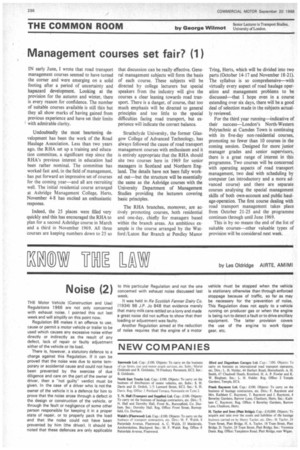Management courses set fair? (1)
Page 260

If you've noticed an error in this article please click here to report it so we can fix it.
IN early June, I wrote that road transport management courses seemed to have turned the corner and were emerging on a solid footing after a period of uncertainty and hapazard development. Looking at the provision for the autumn and winter, there is every reason for confidence. The number of suitable courses available is still thin but they all show marks of having gained from previous experience and have set their limits with admirable clarity.
Undoubtedly the most heartening development has been the work of the Road Haulage Association. Less than two years ago. the RHA set up a training and education committee, a significant step since the RHA's previous interest in education had been rather nominal. The committee has worked fast and, in the field of management, has put forward an impressive set of courses for the coming year—and all are recruiting' well. The initial residential course arranged at Ashridge Management College, Herts, November 4-8 has excited an enthusiastic response.
Indeed. the 25 places were filled very quickly and this has encouraged the RHA to plan for a second Ashridge course in March and a third in November 1969. All three courses are keeping numbers down to 25 so that discussion can be really effective. General management subjects will form the basis of each course. These subjects will be directed by college lecturers but special speakers from the industry will give the courses a clear leaning towards road transport. There is a danger, of course, that too much emphasis will be directed to general principles and too little to the special difficulties facing road transport, but experience will indicate the correct balance.
Strathclyde University, the former Glasgow College of Advanced Technology, has always followed the cause of road transport management courses with enthusiasm and it is entirely appropriate that the RHA should site two courses here in 1969 for senior managers in Scotland and Northern England. The details have not been fully worked out—but the structure will be essentially the same as the Ashridge courses with the University Department of Management Studies providing the lecturers covering basic principles.
The RHA branches, moreover, are actively promoting courses, both residential and one-day, chiefly for managers based within the branch areas. An ambitious example is the course arranged by the Watford /Luton Bar Branch at Pendley Manor Tring, Herts, which will be divided into two parts (October 14-17 and November 18-21). The syllabus is so comprehensive—with virtually every aspect of road haulage operation and management problems to be discussed—that I hope even in a course extending over six days, there will be a good deal of selection made in the subjects actually reviewed.
For the third year running—indicative of their success—London's North-Western Polytechnic at Camden Town is continuing with its five-day non-residential courses, promoting no fewer than 10 courses in the coming session. Designed for more junior manager grades and senior supervisors, there is a great range of interest in this programme. Two courses will be concerned with operating aspects of road transport management, two deal with scheduling by computer (an introductory and a more advanced course) and there are separate courses analysing the special management skills of both own-account and public haulage-operation. The first course dealing with road transport management takes place from October 21-25 and the programme continues through until June 1969.
This is by no means the end of the list of suitable courses—other valuable types of provision will be considered next week.


















































































































































































































































































































































































